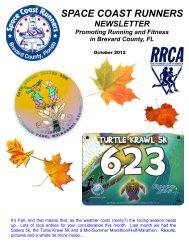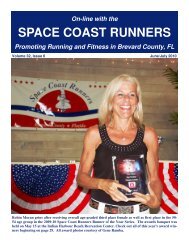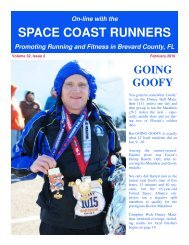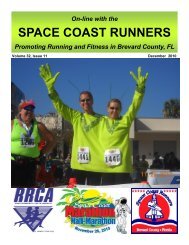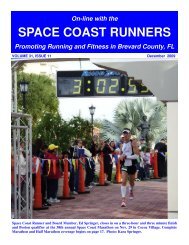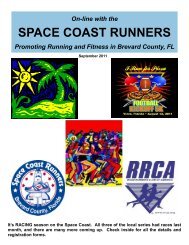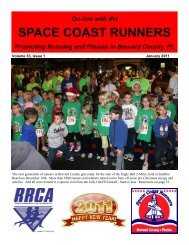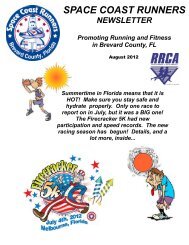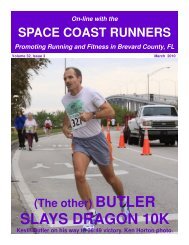May - Space Coast Runners
May - Space Coast Runners
May - Space Coast Runners
- No tags were found...
You also want an ePaper? Increase the reach of your titles
YUMPU automatically turns print PDFs into web optimized ePapers that Google loves.
as much attention as it deserved, Levine and colleague Darren McGuire had aunique opportunity to study the effect of 30 years of aging on a small cadre of ordinaryindividuals. (Other long-term studies had involved elite athletes, a group thatmight not be representative of the rest of us.)The study began in the 1960s, when five college students volunteered for threeweeks' total bed rest. Their catastrophic declines in aerobic conditioning are a majorreason why nurses now prod surgical patients out of bed as quickly as possible.But before being put to bed, the young men were subjected to the type of testingnormally reserved for elite athletes.Thirty years later, McGuire and Levine realized they could retest the same men intheir early 50s. The follow-up study revealed lots of things, not the least of whichwas that the intervening decades hadn't been as hard on their VO2 max values asthe three weeks' bed rest. Of greater interest, though, was the discovery that themen's stroke volumes had increased. It was already known that this happens, asthe heart enlarges to force blood through age-stiffened arteries. But nobody anticipatedthe magnitude of the effect. It turned out to be more than enough to compensatefor the decline in maximum heart rate. A 50-year-old's heart might not beat asrapidly as it once did, but it can pump at least as much blood per minute.What this means is that changes in VO2 max aren't entirely driven by changes in the heart. If the heart is delivering asmuch oxygen as before, but VO2 max is declining, it must be that the muscles are becoming less adept at using it.What precisely is going on is a subject of considerable dispute. Partly, it's simply that people lose muscle mass with age.Smaller muscles use less oxygen.But other factors are probably also involved. Perhaps aging muscles have fewer capillaries to supply them with blood.<strong>May</strong>be they're less able to call for blood when they need it. Or perhaps their cells have fewer mitochondria (the powerhousesin which oxygen is used). Perhaps their arteries become increasingly clogged or inelastic.A more complex theory comes from exercise physiologist Tim Noakes, who argues that for each stride, the aging brainmay simply be using a lower fraction of the available muscle cells. Physiologists have long known that for any givenmovement, our nerves recruit only a fraction of each muscle's fibers, letting the others rest. In the latest edition of Lore ofRunning, Noakes suggests that as we age, our nervous systems may become more cautious about protecting our musclesfrom overload. (This is, however, an extremely controversial theory that has provoked outspoken dissent from otherscientists.)Whatever the cause, the solution is fairly straightforward: run.Richard Brown is a 71-year-old exercise physiologist and coach from Eugene, Ore., whose trainees have included SuzyFavor Hamilton, Vicki Huber and Mary Slaney. He believes that the secret to holding onto as much VO2 max as possibleis simply the old Lydiard approach: run, run, run. "It's just moderate-paced work, where you're going at least 60 minutes,"he says, though he adds that masters runners may want to go this far only two or three times a week. And he adds, "Eatreally good foods."Others believe speed work factors into the mix (reducing the number of longer runs). "Train fairly hard at your 2-mile or5K pace at least once a week, where you're running your heart rate up to 98 percent of maximum," says Portland, Ore.-based coach Bob Williams. "I'm a real believer in that."McMillan concurs. "These are great things to include in your training program," he says of 5K-paced workouts. "I wouldn'tsay year-round, but frequently."He also recommends racing frequently, perhaps once every three to six weeks, particularly 5Ks. "That's a great VO2max workout in and of itself. The more I look at masters runners, the more I think you've got to keep racing. You almostgo back to George Sheehan. He was the king of racing every weekend. It doesn't have to be 100 percent, and you can'tdo long. The more 5Ks and 8Ks you can do, the better. This is completely different from what you'd advise for a 23-yearoldwho wants to go to the Olympics."Page 22



